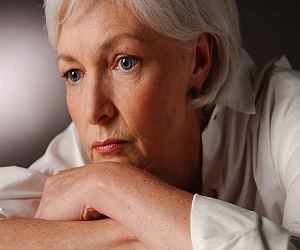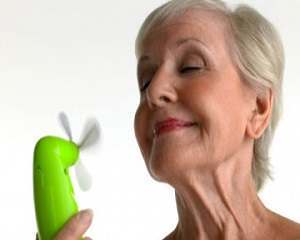
An Overview of Menopause
Menopause is an inevitable stage of a woman’s life, where her reproductive cycles of menstruation come to an end. A woman’s body undergoes numerous changes, both as menopause nears, and even after the transition is over.
Two Kinds of Menopause
 The ovaries hold a lifetime supply of eggs which each woman has from the day she is born. Ovaries also produce estrogen and progesterone, which regulate her ovulation and menstrual cycles.
The ovaries hold a lifetime supply of eggs which each woman has from the day she is born. Ovaries also produce estrogen and progesterone, which regulate her ovulation and menstrual cycles.
Women experience two different kinds of menopause: natural menopause or premature menopause. By the time a woman reaches her forties, her body naturally starts changing: her menstrual cycles diminish, and she experiences natural menopause.
But if, because of either surgical procedures such as a hysterectomy, or ovarian damage from or toward cancer treatment, premature menopause can occur before a woman reaches her forties.
Natural Menopause
Unless there are unnatural or medical circumstances, menopause is a natural, gradual process. The progression of menopause occurs in three phases:
- Perimenopause
- Menopause
- Postmenopause
Perimenopause begins several years before the actual onset of menopause, during which estrogen production is gradually reduced. As a woman gets closer to menopause, however, her estrogen levels start decreasing more quickly. When menopause finally hits, her ovaries stop releasing eggs. For many women, there will be an increase in the notorious hot flashes as well as other physical symptoms.
After menopause, in the postmenopausal period, women are more at risk for a variety of health issues due to their lack of estrogen. However, menopausal symptoms like hot flashes will start to diminish by this time.
Signs of Menopause
 Hot flashes are one of the most common menopause symptoms, caused by an uncontrollable wave of heat that overwhelms the body, even when it is freezing. The severity of these hot flashes varies from woman to woman. In addition to hot flashes, some women experience irregular periods, or intermittent months where she may miss her period. Other symptoms include mood swings, insomnia, irritability, depression, or exhaustion.
Hot flashes are one of the most common menopause symptoms, caused by an uncontrollable wave of heat that overwhelms the body, even when it is freezing. The severity of these hot flashes varies from woman to woman. In addition to hot flashes, some women experience irregular periods, or intermittent months where she may miss her period. Other symptoms include mood swings, insomnia, irritability, depression, or exhaustion.
Some women endure physiological symptoms such as headaches, achy and painful muscles and joints, or heart palpitations. A reduced sex drive and vaginal dryness are also problems that many women suffer. When a woman starts to experience these changes in her body, she can check with her doctor to confirm whether menopause is the cause by taking a blood test to measure the follicle stimulating hormone or FSH level.
In addition, the doctor will conduct a physical examination, including performing a pap test and vaginal assessment, to corroborate the lab results and confirm that she is indeed going through menopause, and at which stage she is in the process.
Postmenopausal Complications
Health related complications associated with a lack of estrogen can include osteoporosis, heart disease, declining muscle tone, aging skin, changes in vision, and bowel and bladder issues. Preventative treatments are available to lower the risk and severity of these symptoms.
TOP 5
MENOPAUSETreatments |
|||||
| MenoClear | Menozac | Avlimil | Promensil | Balance Point | |
|---|---|---|---|---|---|
| 1 | 2 | 3 | 4 | 5 | |
| Price (1 bottle) Price (6 bottles) Best Value |
$49.95 $135.70 |
$49.95 $299.95 |
$29.95 $149.00 |
$35.95 $215.70 |
$39.95 $239.70 |
| Overall Rating | 99.60% | 88.20% | 80.90% | 77.80% | 69.10% |
| Effectiveness |





|





|





|





|





|
| Speed of Results | Extremely Fast | Good | Average | Average | Slow |
| Quality of Ingredients | Premium | Good | Good | Average | Average |
| Customer Satisfaction Evaluation | 99.00% | 86% | 80% | 75% | 66% |
| Safety Evaluation | Safe for Use | Safe for Use | Safe for Use | Safe for Use | Safe for Use |
| Customer Service Rating |





|





|





|





|





|
| Reorder Rate | Highest | Good | Good | Average | Average |
| Return Policy | Risk Free | Unused + Restocking Fee | Risk Free | No | Risk Free |
| Success Rate | 99% | 85.20% | 78% | 74% | 67% |

 Subscribe Now
Subscribe Now











